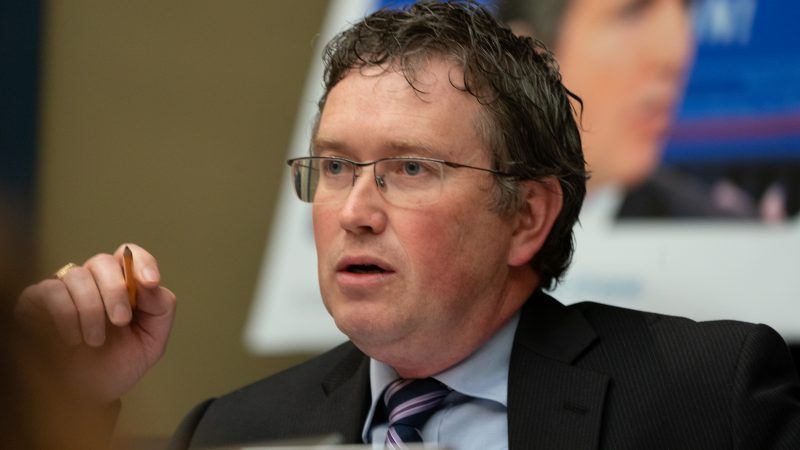Thomas Massie Catches Bipartisan Flak for Suggesting Congress Actually Vote on $19 Billion in Disaster Funding
Demanding that members of Congress be in town to vote on spending huge sums of money seems reasonable.

Libertarian-leaning Rep. Thomas Massie (R–Ky.) is catching flak from all sides of the partisan divide for insisting that Congress hold an actual vote before approving $19.1 billion in federal disaster aid.
On Tuesday, Massie objected to passing a massive disaster relief package by unanimous consent during a brief pro forma session being held while most members of Congress are out of town for a Memorial Day recess.
"If the Speaker of the House felt this was must-pass legislation, the Speaker of the House should have called a vote on this bill before sending every member of Congress on recess for ten days," said Massie on the House floor, adding later on Twitter that "passing an unbudgeted $19 billion spending bill without a vote of Congress is legislative malpractice."
Massie's objection came a few days after Rep. Chip Roy (R–Texas) did the same thing, opposing the bill over both process concerns and its lack of $4.5 billion in border funding.
The delay had produced bipartisan irritation.
"The heartlessness of House Republicans knows no bounds," said House Speaker Nancy Pelosi (D–Calif.) in a statement. "Just days after sabotaging a bipartisan and bicameral bill to provide urgently-needed relief to millions of American families reeling from natural disasters, House Republicans have repeated their stunning act of obstruction."
"I just think that we can do a lot better by passing what's good rather than vote 'no' waiting for the perfect," said Sen. Kevin Cramer (R–N.D.), who voted for the disaster package in the Senate.
Congress has been trying to pass a disaster relief bill since January when the Democrat-controlled House approved a $14 billion aid package.
In early April, that bill failed in the Senate, as did a slightly more modest $13.5 billion Republican-backed bill—which included $600 million in food stamps for Puerto Rico, but omitted additional recovery funding Democrats also wanted for the island.
Holding things up, in part, was opposition from President Donald Trump, who objected to spending additional funds on Puerto Rico.
Shortly after those bills failed, and following floods and tornadoes in the South and Midwest, Senate Democrats introduced a new $17.2 billion disaster aid package. That bill also stalled for over a month after the White House demanded that it include $4.5 billion in spending on humanitarian aid and security operations on the southern border.
Finally, last week a compromise $19.1 billion disaster relief bill was agreed upon that excluded border funding.
According to a summary from the Senate Appropriations Committee, the bill includes $900 million for Puerto Rico, including $600 million in food aid and $300 million in Community Development Block Grants for the island. Other major line items include $3 billion for the Army Corps of Engineers to rebuild damaged infrastructure, another $3 billion to repair damaged military and coast guard facilities, as well as $3 billion in farm support programs.
Also included is another $2.4 billion in general Community Development Block Grants, $1.65 billion for damaged highways, $720 million to the U.S. Forest Service to combat wildfires, and $600 million in economic assistance to storm-damaged communities.
Despite the claims of urgency, much of the funding in the bill comes in the form of these Community Development Block Grants which, the Government Accountability Office (GAO) has found, often take years to disperse. The $3 billion in aid to farmers to cover crop losses stemming from natural disasters is in addition to normal federal price support programs and subsidized crop insurance.
Demanding that individual members of Congress be in town to vote on spending these huge sums of money seems reasonable, particularly given the small role the federal government has played historically in disaster relief.
"The federal government never used to have much of a role in natural disasters," Cato Institute's Chris Edwards told Reason in April. "It was up to states and local governments and private charities to respond to natural disasters. That system worked pretty well."
Rent Free is a weekly newsletter from Christian Britschgi on urbanism and the fight for less regulation, more housing, more property rights, and more freedom in America's cities.

Show Comments (23)